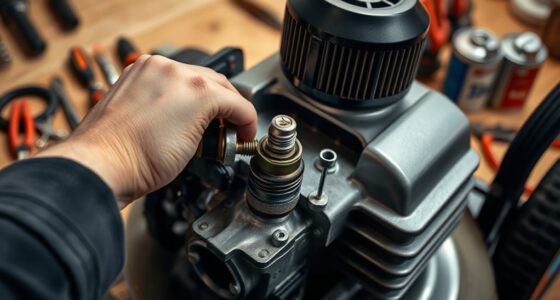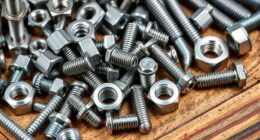When choosing between electric and gas leaf blowers, consider your yard size and need for power. Electric models are lightweight, quieter, and eco-friendly, ideal for small to medium yards, but they may have limited runtime. Gas blowers offer more power and longer operation, perfect for large areas and heavy debris. Think about ease of use, maintenance costs, and noise levels as well. To discover which suits your needs best, explore the details further.
Key Takeaways
- Gas blowers provide more power and airflow for large yards, while electric models are lighter and quieter for small to medium tasks.
- Electric blowers have lower maintenance and operating costs, with no fuel or emissions, making them more eco-friendly.
- Gas blowers tend to be heavier and noisier but offer longer runtime and higher performance for heavy debris.
- Electric models are easier to handle, store, and require less ongoing maintenance, ideal for quick, occasional yard cleanups.
- Consider yard size, debris type, noise preferences, and long-term costs to choose the most suitable blower type.
Power and Performance

When it comes to choosing a leaf blower, understanding its power and performance is essential. The right blower can make leaf blowing and yard cleanup much faster and easier. Gas-powered blowers usually deliver more power, making them ideal for large yards or heavy debris. They can generate higher airflow and velocity, helping you move leaves and debris efficiently. Electric blowers tend to have less power but are lighter and quieter, perfect for smaller tasks or regular yard maintenance. Consider your yard size and the type of debris you face to determine the necessary power level. A high-performance leaf blower guarantees you complete leaf blowing quickly, saving you time and effort during yard cleanup. Additionally, choosing a trustworthy brand can ensure better reliability and product longevity.
Ease of Use and Portability

Choosing a leaf blower that’s easy to use and portable can substantially reduce fatigue and make yard work more manageable. Focus on models with good ergonomics comfort, which means a design that minimizes strain on your arms and back during extended use. Lightweight electric blowers often excel here, offering easier handling and less fatigue. Gas models tend to be heavier, but some feature ergonomic grips and balanced weight distribution to improve comfort. Storage convenience also plays a role—compact designs or those with foldable parts make it simpler to store your blower in tight spaces or small sheds. Additionally, headphones can be helpful for protecting your hearing during extended periods of operation. Overall, selecting a model that combines ergonomic comfort with easy storage guarantees you can work longer, more comfortably, and without hassle.
Environmental Impact and Noise Levels

Have you considered how your leaf blower’s environmental impact and noise levels affect your neighborhood and the planet? Electric leaf blowers produce no emissions during operation, reducing air pollution and greenhouse gases compared to gas-powered models. This means fewer electric emissions contribute to cleaner air and a healthier environment. Additionally, electric blowers tend to be much quieter, helping to decrease noise pollution in your neighborhood. This is especially important if you live in a busy or noise-sensitive area. Gas-powered blowers emit louder noises and more fumes, which can disturb neighbors and contribute to air quality issues. Choosing an electric leaf blower minimizes your environmental footprint and keeps noise levels down, making it a considerate option for eco-conscious users. Color accuracy and contrast ratio are key factors that affect overall image quality in projectors, much like how noise levels influence neighborhood harmony.
Maintenance and Operating Costs

Maintenance and operating costs are key factors to contemplate when selecting a leaf blower, as they directly impact your long-term expenses. Electric blowers typically have lower ongoing costs since they don’t require fuel storage or regular maintenance like changing oil. However, you may need to consider battery replacement costs over time, especially if you use the blower frequently. Gas-powered blowers, on the other hand, involve fuel costs and require storing fuel safely, which can add to your expenses. Additionally, gas engines often need more maintenance, including oil changes and tune-ups, increasing overall costs. While electric models might have a higher upfront price, their lower maintenance and fuel-related expenses often make them more economical in the long run. Proper maintenance can further extend the lifespan of your blower and reduce replacement costs over time.
Battery Life and Fuel Efficiency

Battery life and fuel efficiency are crucial considerations, especially if you need a blower that lasts through extended use. For electric blowers, battery duration determines how long you can work before recharging, so look for models with longer-lasting batteries to avoid interruptions. Gas-powered blowers, on the other hand, are judged by fuel consumption; a more efficient engine will use less fuel, giving you longer operation between refills. Keep in mind that battery capacity directly impacts runtime, while fuel efficiency affects ongoing costs and convenience. If you plan on tackling large jobs, prioritize equipment with superior battery life or fuel efficiency to maximize productivity and reduce downtime. Balancing these factors ensures your blower meets your needs without frequent recharges or refueling. Additionally, understanding power source types can help you choose the most suitable option for your specific tasks.
Weight and Ergonomics

Since you’ll likely be holding and maneuvering your leaf blower for extended periods, weight and ergonomics play a vital role in your comfort and control. A lightweight model reduces fatigue, making yard work less tiring. Look for an ergonomic grip that fits comfortably in your hand, helping you maintain a secure hold without strain. The handle design also matters; an adjustable or well-placed handle can improve balance and reduce wrist or arm fatigue during use. Gas blowers tend to be heavier, so if you’re concerned about weight, an electric model might be more manageable. Prioritize a blower with a comfortable handle design and manageable weight to guarantee you can work efficiently without discomfort or fatigue. Additionally, considering the ergonomic handle design can significantly improve your overall experience during prolonged use.
Cost and Budget Considerations

Balancing cost and budget considerations is key when choosing a leaf blower that fits your needs. Your options include a range of pricing options, from affordable electric models to more expensive gas-powered units with advanced features. Electric blowers tend to have lower upfront costs, but some may require replacement or repairs over time. Gas models often come with higher initial prices but can offer longer-lasting power and greater mobility. Additionally, warranty coverage plays an essential role in protecting your investment. Look for models with extensive warranties that cover parts and repairs, saving you money in the long run. By comparing pricing options and warranty policies, you can select a leaf blower that aligns with your budget while ensuring quality and durability. Considering the cost-effectiveness of different models can help you make a more informed decision based on your specific needs and financial situation.
Suitable Applications and Yard Size

Are you selecting a leaf blower that matches the size of your yard and the types of debris you need to clear? Different yard sizes require different tools for *best* efficiency. For small to medium yards, electric blowers are ideal due to their lightweight design and ease of use. They’re suitable applications for clearing leaves, grass clippings, and light debris in confined spaces. Larger yards, however, benefit from gas-powered blowers that deliver more power and longer run times, making them suitable for heavy-duty tasks like mulching and clearing wet leaves. Consider your specific needs—if you have a vast property, a gas blower provides the power and range necessary. For smaller spaces, electric models offer convenience without sacrificing performance.
Longevity and Durability

When choosing a leaf blower, it’s vital to take into account its longevity and durability, as these factors determine how well the tool will perform over time. A longer warranty period often indicates confidence in the product’s durability, giving you peace of mind. Material quality also plays an important role; high-quality materials resist wear and tear better, extending the lifespan of your blower. Proper storage practices can also help maintain the blower’s condition and functionality over the years. Consider these key points:
- Look for a blower with a warranty period of at least two years for added assurance.
- Prioritize models made from durable, corrosion-resistant materials.
- Regular maintenance can greatly enhance longevity, regardless of the type.
Frequently Asked Questions
Are Electric Leaf Blowers Suitable for Heavy-Duty Yard Cleanup?
Electric leaf blowers are generally not ideal for heavy-duty yard cleanup because their battery power often limits runtime and airflow, making them less effective for large, tough jobs. Plus, while they tend to have lower noise levels, their shorter battery life means you might need multiple charges or a cord, which can hinder convenience for extensive cleanup. For serious clearing, gas-powered blowers usually offer more power and longer operation.
Can Gas Leaf Blowers Be Used Indoors or in Enclosed Spaces?
You shouldn’t use gas leaf blowers indoors or in enclosed spaces because of indoor safety and ventilation requirements. Gas blowers emit fumes and carbon monoxide, which can quickly build up and cause health hazards. Proper ventilation is essential, but even with it, using a gas blower indoors is risky. Always operate gas blowers outdoors where fresh air can disperse fumes safely, ensuring your safety and well-being.
How Do Weather Conditions Affect Leaf Blower Performance?
Weather conditions substantially impact your leaf blower’s performance. High humidity can reduce airflow efficiency and cause moisture buildup on parts, potentially leading to rust or damage. Wind influence plays a role too; strong gusts can make it harder to control the airflow, and blowing leaves into other areas. You should operate your blower carefully in windy or humid conditions, adjusting your technique to maintain control and prevent damage or inefficiency.
Are There Safety Concerns Specific to Electric Versus Gas Models?
You might find that safety concerns differ between electric and gas leaf blowers. Electric models often pose fewer electrical hazards when properly maintained, but you still need to avoid water exposure and damaged cords. Gas blowers bring fuel safety into focus—they require careful handling to prevent leaks or fires. Both types demand attention to safety protocols, but electric blowers generally offer a simpler, cleaner experience with fewer risks related to fuel safety.
What Are the Available Accessory Options for Each Type?
You’ll find a variety of accessory options for both electric and gas leaf blowers. For electric models, battery options allow you to choose different power capacities, extending your run time. Nozzle attachments help customize airflow for debris clearing or leaf gathering. Gas blowers also have nozzle attachments, often more durable, and some models offer different fuel options. These accessories enhance functionality, making your leaf cleanup more efficient and tailored to your needs.
Conclusion
Choosing between an electric and gas leaf blower is like picking the right partner for your yard work. Imagine yourself tackling autumn leaves with ease, feeling confident and in control—whether it’s the quiet assurance of an electric model or the raw power of gas. Remember, your choice shapes your outdoor experience, just like the right tool shapes a beautiful yard. Pick wisely, and watch your outdoor space flourish like a well-tended garden of your efforts.









